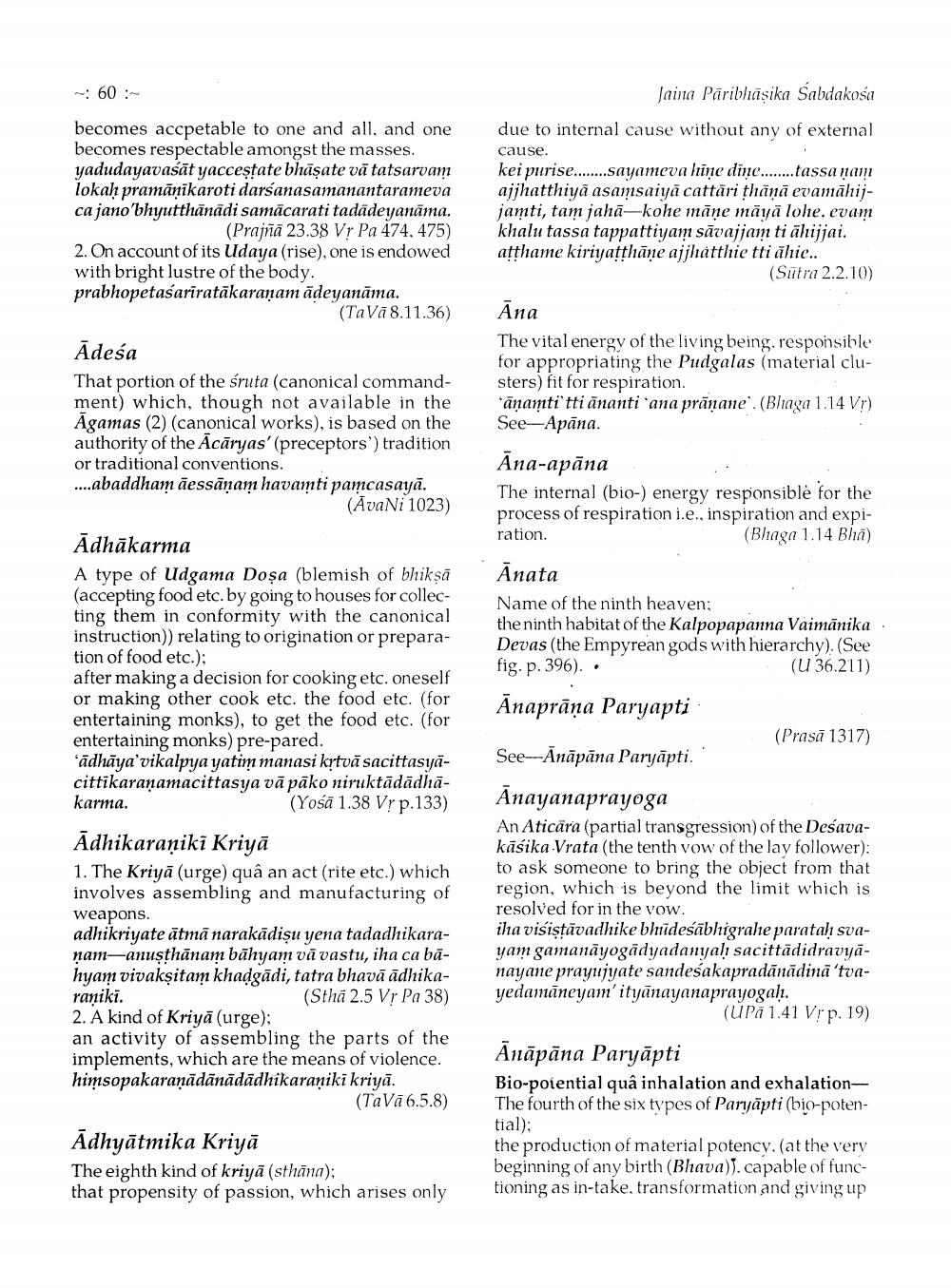________________
- 60:
Jaina Pāribhāsika Sabdakosa
becomes accpetable to one and all, and one becomes respectable amongst the masses. yadudayavasāt yacceștate bhāşate vă tatsarvam lokah pramānikaroti darśanasamanantarameva ca jano'bhyutthānādi samācarati tadadeyanāma.
(Prajna 23.38 V? Pa 474,475) 2. On account of its Udaya (rise), one is endowed with bright lustre of the body. prabhopetasariratākaraṇam ādeyanāma.
(TaVā8.11.36)
due to internal cause without any of external cause. kei purise........sayameva hise dine.......tassa nam ajjhatthiyā asamsaiyā cattāri thănā evamāhijjamti, tam jahā-kohe māne māyā lolie. evam khalu tassa tappattiyam sāvajjam ti āhijjai. atthame kiriyatthāne ajjhátthietti älie..
(Sutra 2.2.10)
Ādesa That portion of the sruta (canonical commandment) which, though not available in the Agamas (2) (canonical works), is based on the authority of the Acāryas' (preceptors') tradition or traditional conventions. ...abaddham āessānam havamti pamcasayā.
(AvaNi 1023)
Ana The vital energy of the living being responsible for appropriating the Pudgalas (material clusters) fit for respiration. 'āņamti'tti ānanti 'ana prānane (Blaga 1.14 V!) See-Apāna.
Апа-арапа The internal (bio-) energy responsible for the process of respiration i.e., inspiration and expiration.
(Bhagn 1.14 Bha)
Ādhākarma A type of Udgama Dosa (blemish of bhiksā (accepting food etc. by going to houses for collecting them in conformity with the canonical instruction)) relating to origination or preparation of food etc.); after making a decision for cooking etc. oneself or making other cook etc. the food etc. (for entertaining monks), to get the food etc. (for entertaining monks) pre-pared. 'adhāya'vikalpya yatim manasi kytvā sacittasyacittikaraṇamacittasya vā pāko niruktādādhākarma.
(Yośā 1.38 Vr p.133)
Anata Name of the ninth heaven; the ninth habitat of the Kalpopapanna Vaimānika. Devas (the Empyrean gods with hierarchy). (See fig. p. 396). .
(U 36.211)
Anaprāņa Paryapti
(Prasā 1317)
See-Anāpāna Paryāpti.
Adhikaraṇiki Kriyā 1. The Kriyā (urge) quâ an act (rite etc.) which involves assembling and manufacturing of weapons. adhikriyate ātmānarakādişu yena tadadhikaranam-anuşthānam bāhyam vă vastu, iha ca bāhyam vivaksitam khadgādi, tatra bhavā ādhikaraniki.
(Sthā 2.5 Vr Pa 38) 2. A kind of Kriya (urge); an activity of assembling the parts of the implements, which are the means of violence. himsopakaraņādānādādhikaraniki kriyā.
(Tavā 6.5.8)
Anayanaprayoga An Aticāra (partial transgression) of the Desavakāsika.Vrata (the tenth vow of the lay follower): to ask someone to bring the object from that region, which is beyond the limit which is resolved for in the vow. iha visiştāvadhike bhidesābhigrahe paratah svayam gamanāyogādyadanyalı sacittādidravy.nayane prayujyate sandesakapradānädinā'tvayedamāneyam' ityānayanaprayogah.
(ũPõ 141 Vợp. 19)
Anāpāna Paryāpti Bio-potential quâ inhalation and exhalationThe fourth of the six types of Paryjāpti (bio-potential); the production of material potency. (at the very beginning of any birth (Bhava), capable of functioning as in-take, transformation and giving up
Ādhyātmika Kriyā The eighth kind of kriyā (sthāna); that propensity of passion, which arises only




